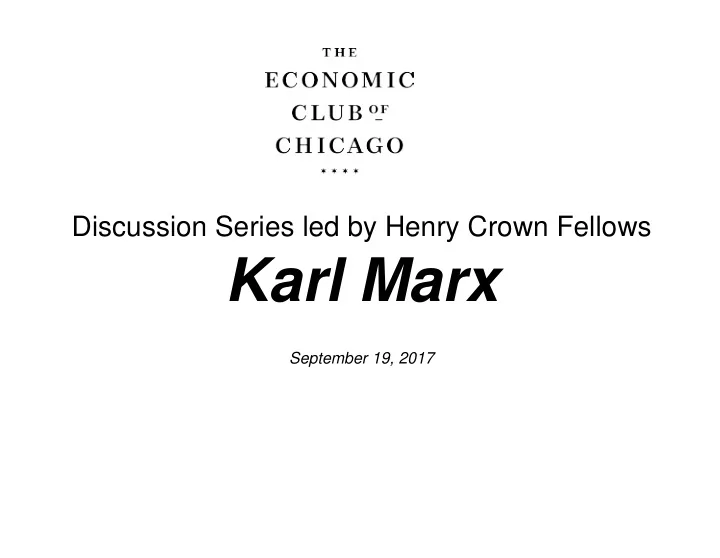

Discussion Series led by Henry Crown Fellows Karl Marx September 19, 2017
Karl Marx • Born in Trier, Germany in 1818. • Father was Jewish but became Protestant to help practice law. • Fought a duel at age 17. Transferred to University of Berlin. • Studied Philosophy (!!!) not Economics. Thesis was on Democritus and Epicurus. • Married to Jenny von Westphalen in 1843 and had six children. • Marx wrote for Communist Journal – French Annals in 1843. • Important – Marx joined communist organizations. He did not invent or originate communism or socialism.
Met Friedrich Engels in 1842. Son of wealthy German cotton industrialist.
• 1843: Publishes “On the Jewish Question.” “Problem” with Jews is not their orthodox religion, but their tendency to exploit by lending money. Calls for “the emancipation of society from Judaism.” • 1844: Accused by Prussian government of high treason for articles he has written calling for revolution. Effectively exiled for life. • 1847: Marx and Engels join “The Communist League”. • 1848: Marx and Engels selected by the Communist League to publish The Communist Manifesto. • 1848-1849: Revolutions across Europe. • 1849: Marx family moved to London. • 1867: Wrote first volume of Das Capital. • 1883: Died in England.
Heavily Influenced by Hegel and Feuerbach HEGEL • Dialectic. • Thesis – Antithesis – Synthesis. • Two forces in opposition produce a new third outcome. • Human history is the story of opposing forces producing change, but always toward freedom. • Alienation! Society forces mankind away from natural self. Feuerbach • Materialism. • How people earn their living determines structure of society and ideas. • “Things” determine “ideas” at least as much as the other way round.
Marx Introduces Dialectic Materialism • Marx takes Hegel’s Dialectic and adds Materialism. • History is NOT best understood as the development of ideas (Plato’s Idealism). • History is best understood through the study of Material THINGS, the tools by which men and women earn their livings, the jobs they do. • To understand history, you must understand economic forces and means of production. • The SUPER-STRUCTURE (form of government, religion, etc.) based on means of production.
Six Stages of History Driven by Economics • Each stage of history represents more advanced technology of production. • Movement to next stage of history caused by class conflict. • One class controls the wealth, opposition class eventually rebels. 1) Primitive Communism – Tribalism – Hunt in groups / divide food evenly. – Everyone hunts, shares. – No classes. 2) Slavery – Domestication of animals and agriculture lead to private property and classes. – Leads to Slave Owners who own the land and slaves who work the fields.
Six Stages of History Driven by Economics 3) Feudalism – Lords and Serfs – Technical advancement such as hand-mill lead to special skills and guilds. – “The hand-mill gives you society with the feudal lord; the steam-mill society with the industrial capitalist.” 4) Capitalism – Factory Owners and Workers – Development of Steam engine produces factories. – Labor now concentrated in cities. – Capitalists own factories – workers earn salaries, factory owners (Bourgeoisie) and workers (“Proletariat”).
Six Stages of History Driven by Economics 5) Socialism – Produced by workers overthrowing capitalists. – Transition period of indeterminate length in which elite “Communist Vanguard” teaches masses about socialism. – Equitable distribution of goods. – State control of means of production. 6) Communism – Workers state “withers away”. – Private property, class struggle exploitation disappear. – “From each according to his ability, to each according to his needs.”
The Contradictions of Capitalism • Capitalists want to maximize profits by minimizing costs. • Capitalist cut wages of workers to a subsistence level. • But now workers don’t have enough money to buy the Capitalist products. • CONTRADICTION! • Capitalists want to cut costs by moving production overseas. • Local workers lose their jobs and cannot buy Capitalist products. • CONTRADICTION! • Capitalists want to cut costs by introducing technology. • Technology reduces number of workers, who cannot buy products. • CONTRADICTION!
Path from Capitalism to Socialism • Capitalists pay only a subsistence wage, but sell products at a profit. • Workers have created all of the economic value, but Capitalist sells for more than he pays. • Workers have produced SURPLUS VALUE which is stolen from them. • Eventually workers (“the Proletariat”) realize they are being exploited. • They rebel against the Capitalists (“the Bourgeoisie”) and form Socialist Societies and ultimately Communist Societies. • “Workers of the World Unite! You have nothing to lose but your chains.”
Marx Criticisms of Capitalism 1) Alienation - Capitalism makes man a machine. 2) Insecurity - A man can be fired at a moment’s notice. 3) Competitive wage reduction - Competition to increase profits forces capitalists to cut wages to a subsistence level. 4) Globalization - Capitalists have incentive to move work overseas. 5) Technology - Capitalists replace workers with machines. 6) Excessive Abundance - Capitalism is so efficient it produces more goods than society needs, leading to massive economic downturns. 7) Demeaning of Professions - Every occupation is stripped of its awe. Lawyers, doctors, priests, poets, all become wage laborers. 8) Demeaning Marriage - Family ties become articles of commerce. 9) Expropriation of Value - Workers create all value but Capitalists steal it. Surplus Value. 10) Inequality - The efficiencies of Capitalism are produced by the many but captured by only a few.
Your Questions • Which of Marx’s criticisms of Capitalism do you find most compelling? • Where was Marx most wrong about Capitalism? • Most Marxist countries didn’t work out well. Was there a fatal flaw in Marx’s philosophy that doomed future Marxist societies? • All past economic and social systems (Slavery, Feudalism) have had beginnings, evolved and eventually ended. Why should Capitalism be different?
Recommend
More recommend